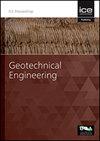Design of Deep Rock Tunnels combining the Hyperstatic Reaction and Convergence Confinement methods
IF 1.7
4区 工程技术
Q3 ENGINEERING, GEOLOGICAL
Proceedings of the Institution of Civil Engineers-Geotechnical Engineering
Pub Date : 2022-07-11
DOI:10.1680/jgeen.22.00051
引用次数: 0
Abstract
Tunnel lining is usually installed with delay behind the tunnel face excavation, which requires that a displacement has to be considered at the tunnel boundary before the support structure installation. This delayed installation comes with a release and redistribution of stress in the rock mass. Internal tunnel lining forces significantly rely on the stress relaxation process taking place in the rock mass surrounding the excavated tunnel. One of the difficulties when designing tunnel supports is, therefore, to analyze the rock-support interaction considering the tunnel lining convergence caused by the stress redistribution. In this study, a simple and effective calculation process based on the combination of two methods, the Hyperstatic Reaction Method (HRM) and Convergence Confinement Method (CCM), is presented to analyze the interaction of rock mass and support structure. The rock mass is assumed to obey the Hoek-Brown criterion. The stress release is also taken into consideration in the present method. The present method is validated by comparing results of the HRM in terms of tunnel lining forces against the analytical ones. Thereafter, the effect of the stress release coefficient, of the tunnel depth and of the Hoek-Brown criterion parameters (the Geological Strength Index (GSI) and σci), on the lining internal forces are presented and discussed.超静力反应与收敛约束相结合的深部岩质隧道设计
隧道衬砌通常在隧道开挖后延迟安装,这就要求在安装支护结构之前必须考虑隧道边界的位移。这种延迟的安装伴随着岩体中应力的释放和重新分配。隧道衬砌内力很大程度上依赖于开挖隧道周围岩体的应力松弛过程。因此,考虑应力重分布引起的衬砌收敛,分析围岩与支护的相互作用是隧道支护设计的难点之一。本文提出了一种基于超静力反应法(HRM)和收敛约束法(CCM)两种方法相结合的简单有效的计算方法来分析岩体与支护结构的相互作用。假定岩体服从Hoek-Brown准则。本方法还考虑了应力释放。通过将HRM在隧道衬砌力方面的结果与分析结果进行比较,验证了本方法的有效性。然后,给出并讨论了应力释放系数、隧道深度、Hoek-Brown准则参数(地质强度指数(GSI)和σci)对衬砌内力的影响。
本文章由计算机程序翻译,如有差异,请以英文原文为准。
求助全文
约1分钟内获得全文
求助全文
来源期刊
CiteScore
4.40
自引率
4.50%
发文量
68
审稿时长
3 months
期刊介绍:
Geotechnical Engineering provides a forum for the publication of high quality, topical and relevant technical papers covering all aspects of geotechnical research, design, construction and performance. The journal aims to be of interest to those civil, structural or geotechnical engineering practitioners wishing to develop a greater understanding of the influence of geotechnics on the built environment.

 求助内容:
求助内容: 应助结果提醒方式:
应助结果提醒方式:


